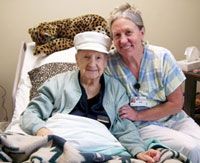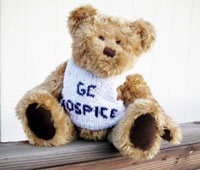Healthy Happenings August 2011
Quality Of Life When
Approaching End Of Life
Hospice Care
 Quality of life is something WE ALL WANT. Quality of life brings about a sense of well being and gives us peace, comfort and dignity. We strive for quality throughout life. When facing a life limiting condition such as a terminal disease or advanced aging, hospice care helps people maintain their dignity, promotes comfort and peace of mind. Quality of life is something WE ALL WANT. Quality of life brings about a sense of well being and gives us peace, comfort and dignity. We strive for quality throughout life. When facing a life limiting condition such as a terminal disease or advanced aging, hospice care helps people maintain their dignity, promotes comfort and peace of mind.
When a person is faced with a serious illness or a life limiting disease or condition, quality of life is often compromised. Hospice provides special care and services to improve the quality of life for both the patient and family. Seeking hospice isn’t about “giving up hope” or “hastening death”, but rather a way to get the most appropriate care in the last phase of life. Some patients benefit so much from the added care, they are able to extend their lives and in some cases, even leave the hospice program.
 Although death is a natural part of life, the thought of dying understandably still frightens many people, and is sometimes even a taboo subject. Consequently, many patients and their families remain reluctant to even discuss the possibility of hospice care. Even though most people would prefer to die in their own homes, being able to spend time with their loved ones, it is still more the norm to have a terminally ill person hospitalized, receiving treatments that either create undesirable side effects or are ineffective. Often Hospice care is chosen so late in a person’s terminal illness that all the benefits of achieving quality of life are not met. Hospice is traditionally an option for people whose life expectancy is six months or less, and for people choosing palliative care (pain & symptom management) rather than ongoing curative measures. By doing so, earlier in the course of the life limiting condition enables a patient to live life to the fullest, with purpose, dignity and support. Although death is a natural part of life, the thought of dying understandably still frightens many people, and is sometimes even a taboo subject. Consequently, many patients and their families remain reluctant to even discuss the possibility of hospice care. Even though most people would prefer to die in their own homes, being able to spend time with their loved ones, it is still more the norm to have a terminally ill person hospitalized, receiving treatments that either create undesirable side effects or are ineffective. Often Hospice care is chosen so late in a person’s terminal illness that all the benefits of achieving quality of life are not met. Hospice is traditionally an option for people whose life expectancy is six months or less, and for people choosing palliative care (pain & symptom management) rather than ongoing curative measures. By doing so, earlier in the course of the life limiting condition enables a patient to live life to the fullest, with purpose, dignity and support.
  Hospice care focuses on all aspects of a person’s well-being: physical, social, emotional, and spiritual. This is accomplished through an interdisciplinary team that includes the patient’s physician, a hospice medical doctor, registered nurses, certified nurse aides, pharmacists, social workers, clergy, a physical therapist, and trained volunteers. There is no age restriction; anyone in the late stages of life is eligible for hospice services. The Hospice Team works together to provide support according to the needs, wishes and beliefs of the patient and family. The goal is to provide the highest level of care necessary to achieve optimal well-being. Hospice care focuses on all aspects of a person’s well-being: physical, social, emotional, and spiritual. This is accomplished through an interdisciplinary team that includes the patient’s physician, a hospice medical doctor, registered nurses, certified nurse aides, pharmacists, social workers, clergy, a physical therapist, and trained volunteers. There is no age restriction; anyone in the late stages of life is eligible for hospice services. The Hospice Team works together to provide support according to the needs, wishes and beliefs of the patient and family. The goal is to provide the highest level of care necessary to achieve optimal well-being.
Hospice care providers offer specialized knowledge and support at the end of life just as obstetricians lend support and expertise at the start of life. Hospice can reduce anxiety in both the terminally ill patient and his or her family by helping them make the most of the time remaining. The support given to patients and families, in their time of need, helps many patients feel less of a burden to their loved ones.
Grand County Hospice is locally  owned and is here to serve the community of Moab and all of Grand County. Hospice is a service available to people of any age, facing a life limiting condition. Hospice is covered by Medicare/Medicaid and private insurance. Hospice can help people who have a terminal disease, or chronic condition which is no longer responding to curative treatment and is taking a toll on quality of life. owned and is here to serve the community of Moab and all of Grand County. Hospice is a service available to people of any age, facing a life limiting condition. Hospice is covered by Medicare/Medicaid and private insurance. Hospice can help people who have a terminal disease, or chronic condition which is no longer responding to curative treatment and is taking a toll on quality of life.
|